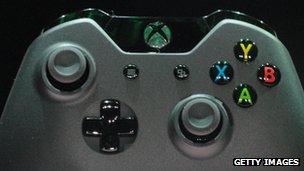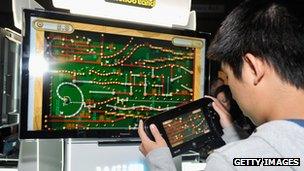E3 2013: Is this the end of an era for games consoles?
- Published
Industry insiders in LA look ahead to this year's E3
From an age of power and domination to one of uncertainty and great unknowns - the next few days could make or break the biggest names in video gaming.
This year's E3 - that's Electronic Entertainment Expo - is more than just the biggest gaming event in the calendar. It's a starting pistol for the next phase of living room domination, as the first set of next-generation games consoles for seven years takes centre stage.
To understand how this multi-billion pound industry got to this point, it's useful to return to where we were just 18 years ago.
It was 1995, and gaming journalists - there weren't as many back then - were filing their way around the Los Angeles Convention Centre for the first-ever E3.
The news on everyone's lips that week was about the cocky newcomer: Sony. Its PlayStation console was looking to muscle in on the already established, and well-loved, brands of Sega and Nintendo.
They were fighting for the biggest slice of a $4bn prize. Sega had its Saturn, and Nintendo - stylishly absent from the show - would in the coming months launch the N64, while already consigned to oblivion was Atari's Jaguar.
Merry-go-round
As it turned out it was the PlayStation that took the industry to another level, forcing the transition from geeky to mainstream, bringing the sales of top games in line with blockbuster films for the first time.
At E3 2013, the battle is now for an industry that is worth an estimated $18.3bn (£11.8bn).
But that number doesn't tell the whole story, down as it is from the all-time high of $28.9bn in 2008.
"In 2012 the World market for boxed console and PC games dropped a significant 18%," says Piers Harding-Rolls, a director and gaming expert from analysts IHS.
"This year the market has been quiet, partly due to the console transition and lack of new releases.
"There have been a few stand out titles that have sold well - Bioshock Infinite, Tomb Raider as examples, but numerous second-tier titles have underperformed. We forecast the world boxed game market sales to decline this year by 10% to $20.2bn, including boxed PC games."
In this year and next, sales will of course be boosted by the new consoles on show but, crucially, experts don't think the market can make up the lost ground.
Pocket power
Why? Depending on how you're reading this, the answer could be in your hand.
"The competitive landscape for consoles is markedly different from the launch of previous generations in that there are many more competing channels and devices for playing games active in the average home," says Mr Harding-Rolls.
"This means there is more chance of console gamers splintering off onto other devices."
Most disruptive of those "other devices" has been mobile gaming.
Game director Bruce Straley discusses violence in The Last of Us, and Ashley Johnson talks about playing "Ellie"
Smartphones and tablets have become the tool of choice for the casual gamer - with millions of pounds being spent on titles that fill the on-the-bus void, money that historically may have been spent on handheld consoles, or games to play at home.
With mobile, not only have platforms changed, but expectations too: popular games costing around £1 have forced developers to rapidly rethink how they make money from their titles, many resorting to in-app payments, much to many gamers' annoyance.
Even the console's home turf - the living room or bedroom - is facing a significant onslaught by smaller, cheaper rivals.
Full-screen, high-definition gaming can be offered by devices at a fraction of the price - such as the Kickstarter-backed Ouya - or via hardware many people already own, like Apple's iPad.
Not to be ignored is Valve, whose Steam Box console - an attempt to bring PC-style gaming to the living room - is expected to emerge any day now.
With a massive existing customer base, it could be a formidable contender.
King of the set-top boxes
But the big guns certainly aren't giving up that easily.
Ahead of this week's event, the two main players - Microsoft and Sony - have laid out their strategy, if only partially.
In what went down as one of the more peculiar launch events in recent memory, Sony managed to launch the PlayStation 4 in February without even showing what the device looks like, instead deciding to simply show off some of the games and technology fans can expect when the console hits the shelves some time later this year.
Whether intentional or not, this focus on games stood the PS4 launch in good stead up against what Microsoft would come up with last month when launching the Xbox One.
In a presentation which ranged from Call of Duty to American Football - via Skype video-calling and Speilberg-backed TV projects - many hardcore gamers wondered if Microsoft still had its eyes on the prize, or whether it was allowing itself to become distracted in its quest to become king of the living room set top boxes.
From the Microsoft stand at E3, we're expecting an attempt to right those wrongs - introducing a stronger line-up of next-gen games, along with a better idea of how its ground-breaking Kinect platform is to evolve alongside the new console.
Nintendo's nerves
One perhaps unwelcome parallel between the first E3 and 2013's will be the relative silence of Nintendo.
While it will have a presence on the show floor, and a minor press event, the Japanese firm will not be firing on all cylinders when compared to its key rivals.
In 1995, such a strategy was adopted because the company was holding back: the N64 was due the following Spring.

The launch of the Xbox One was criticised for being too focused on TV rather than gaming
This time around, it's far more precarious. The Wii U console, a follow on from the wildly successful Wii, is already out - and already heavily discounted.
"There is no doubt that 2013 has so far been a difficult year for the Wii U," says Mr Harding-Rolls from IHS.
"World sales to consumers of the platform in the first quarter were a disappointing 600,000.
"There has been a lack of interest in the platform due to the paucity of heavy-hitting content and minimal marketing."
But - on the plus side for Nintendo fans - we're yet to see a flagship title featuring the firm's chubby Italian asset: Super Mario.
"We still expect there to be a substantial improvement for the platform in the second half of 2013, when big new games hit the platform and Nintendo ramps up its marketing efforts."
'Huge step'
There are many questions that will be raised at this year's E3, but just as it did in 1995, it may just take another 18 years to fully answer.
"The TV gaming space is ripe for disruption so it's likely the next three years will see some significant change to the established console order," concludes Mr Harding-Rolls.
"We may not see traditional console launches in quite this format again, but overall devices and platforms that serve games are increasing in importance in the home - not diminishing.

Nintendo's Wii U certainly looks interesting, but it has had a slow start
"On this basis, it's more the relevance of the term 'console' that is in question rather than the idea of a device that serves games into the home."
For the next few days, however, gamers and developers will be eager to focus simply on what the next-generation consoles can do that we've never seen before.
"This is a huge step again," says Yves Guillemot, chief executive of publisher Ubisoft.
"It will really allow the games to be very different.
"But it will also take time to take full advantage of those machines. We can optimise the machines more and more with time."
Follow Dave Lee on Twitter @DaveLeeBBC, external
- Published22 May 2013
- Published22 May 2013
- Published21 May 2013
- Published21 February 2013
- Published21 February 2013
- Published21 February 2013